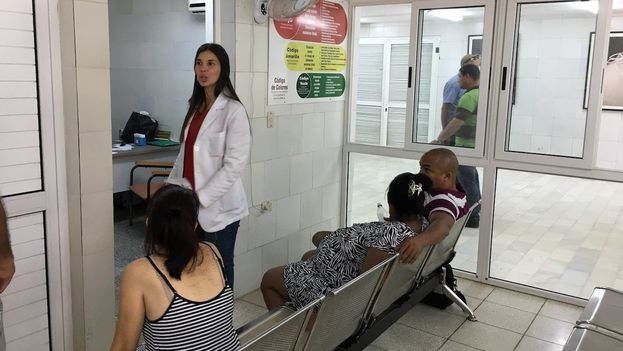
![]() 14ymedio, Yoani Sanchez, Generation Y, Havana, 19 December 2019 — Recently and after people read an article published by the journalist Elaine Díaz, director of the digital site Periodismo de Barrio, the issue of obstetric violence has once again generated debate on social networks and is forcing many to rethink everything that happens in labor and delivery rooms throughout Cuba.
14ymedio, Yoani Sanchez, Generation Y, Havana, 19 December 2019 — Recently and after people read an article published by the journalist Elaine Díaz, director of the digital site Periodismo de Barrio, the issue of obstetric violence has once again generated debate on social networks and is forcing many to rethink everything that happens in labor and delivery rooms throughout Cuba.
Obstetric violence is any practice, whether by action or omission, that is carried out by health personnel that affects the reproductive process of women, including dehumanized treatment, unjustified medication and pathologization of processes that are natural. To that general definition, I add the violation of ethical principles in the treatment of pregnant women, mockery or derision, the violation of their privacy and even preventing them from surrounding themselves with their loved ones during the time of delivery.
How many stories of disrespect, abuse and neglect do we not hear every day about women who are treated in Cuban gynecological and obstetric hospitals? Starting because a woman must go through this difficult moment of giving birth alone without the company of her husband or her family, because in the hospitals of this Island having others present during childbirth is still not allowed. The managers blame the lack of resources and privacy in the delivery rooms (where multiple women may be giving birth at the same time), but this robs the parents of the magical moment of birth, where the ties are established that are indestructible for the rest of one’s life.
The poor conditions of the hospitals, and the lack of hygiene and adequate infrastructure that contribute to this, means that the hours of waiting for the birth take place in rooms lacking the minimum conditions. Many times times a pregnant woman even has no water to drink, if she hasn’t brought her own from home. To this is added the little information she receives about the whole process she is going through. Medical care in Cuba frequently includes a lack of transparency towards the person being treated.
It is also obstetric violence not to ask the pregnant woman for permission to invade her privacy with a group of students who arrive to observe the process of dilation and childbirth. Although it is very good that young people who will be future doctors learn, this must be subject to the woman’s consent and must be announced in advance and the woman notified. Other harmful practices that are repeated throughout this country are physical touching by more than one person, the episiotomy or external cut as a routine procedure and even the systemic use of forceps.
Many will be surprised to learn that these procedures, so common on this Island, are considered by numerous international organizations as obstetric violence. But I add also that a part of this type of violence are the jokes, the phrases we hear so often from the mouths of nurses and medical staff in the style of “from pleasure comes pain” or “if you enjoyed it then now you have to suffer” which we hear too lightly in our obstetric centers. They are all forms of humiliation.
If we add that pregnant women often have to offer gifts and even payments to receive better care, to get a bed in a room more quickly, and that their family members must bring all or almost everything they will need during their stay in the hospital, starting with sheets, a fan and even a bucket to carry water to flush the toilet, all of which makes the natural process of childbirth a true ordeal for many Cuban women.
To respect the woman at that important moment of her life, to give her a beautiful and non-traumatic experience, to inform her at every step, abide by her decisions, take her privacy into account and respect her body are practices that must be inextricably linked to the medical process of helping to bear a child. Without that, childbirth becomes dehumanized and the woman is left with an open wound for life: in her sensitivity, in her self-esteem and in her femininity.
________________________
COLLABORATE WITH OUR WORK: The 14ymedio team is committed to practicing serious journalism that reflects Cuba’s reality in all its depth. Thank you for joining us on this long journey. We invite you to continue supporting us by becoming a member of 14ymedio now. Together we can continue transforming journalism in Cuba.
